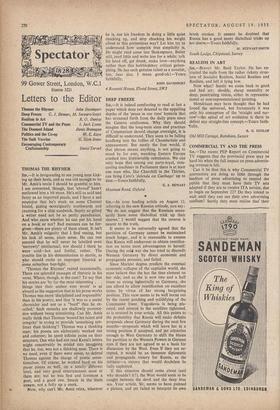Letters to the Editor
Thomas the Rhymer Deep Freeze C. J. Hewart, Realism in Art Commercial TV and the Press The Doomed Island Politics and the Co-op The Salk Vaccine
Encouraging Contemporary Craftsmanship
John Davenport M. Stewart-Smith R. 0. Dunlop L Jack Lyons Denis Branagan W. E. Kaye G. Glyn Jones David Torvell THOMAS THE RHYMER
Sus,—It is invigorating to see young men kick- ing up their heels, and as one old enough to be Mr. Amis's uncle I should be grateful to him. I am concerned, though, that 'abroad' hasn't mellowed him a bit more. He's still as acid and fuzzy as an imported peach, and I have a sad suspicion that he's stuck on some Channel Island, gazing nostalgically northwards and yearning for a chip sandwich. Surely so gifted a writer need not be so pertly paradoxical. And who cares whether he can put his hand on a book or not? Bad manners can be for- given—there are plenty of them about. It isn't Mr. Amis's vulgarity that I find vexing, but his lack of sense, plain sense. He can rest assured that he will never be labelled even `narrowly' intellectual; nor should I think he were cold—hot and fretful, rather. The trouble lies in his determination to startle, as who should recite an improper limerick at some suburban bun-fight, Thomas the Rhymer' ranted occasionally. There are splendid passages of rhetoric in his verse. Where, though, is the cant? To say that his stories are 'by far the most interesting . . . things that their author ever wrote' is as absurd as the suggestion that in his prose works Thomas was more 'disciplined and responsible' than in his poetry, and that 'it was as a social chronicler and not as a "bard" that he ex- celled.' Such remarks are shallowly provoca- tive without being stimulating. Can Mr. Amis really think that Thomas 'wasted his talent and integrity' in trying to provide 'something sub- limer than thinking'? Thomas was a thinking man; his poems are elaborately worked out and coherent; he spent infinite pains on their structure. One who had not read Keats's letters might conceivably be misled into imagining that he, too, was not a thinking man. There is
no need, even if there were space, to defend Thomas against the charge of poetic sensa- tionalism. Of course, be worked hard on his
prose pieces as well, on a totally different level, and very good entertainment most of them are; but he was first and foremost a poet, and a good one. Smack in the main stream, not a folly up a creek.
Now, why can't Mr. Amis relax, wherever
he is, use his freedom in doing a little quiet checking up, and stop chucking his weight about in this pretentious way? Let him try to understand how complex true simplicity is. He might read some late Shakespeare. Better still, read little and write less for a while; talk his head off, get drunk, make love—anything rather than this hobbledehoy critical galum- phing. He has such genuine talent as a novelist, too, Taus deo. I mean good-oh!—Yours faithfully,
JOHN DAVENPORT
4 Rossetti House, Flood Street, SW3


































 Previous page
Previous page